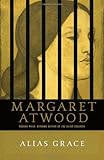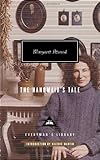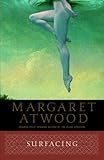|
|
Help |
| Home - Authors - Atwood Margaret (Books) | |
e99 Online Shopping Mall
|
|
Help |
| Home - Authors - Atwood Margaret (Books) | |
| 1-20 of 100 | Next 20 |
click price to see details click image to enlarge click link to go to the store
| 1. The Year of the Flood by Margaret Atwood | |
 | Paperback: 448
Pages
(2010-07-27)
list price: US$15.00 -- used & new: US$8.33 (price subject to change: see help) Asin: 0307455475 Average Customer Review: Canada | United Kingdom | Germany | France | Japan |
|
Editorial Review Product Description The times and species have been changing at a rapid rate, and the social compact is wearing as thin as environmental stability. Adam One, the kindly leader of the God's Gardeners--a religion devoted to the melding of science and religion, as well as the preservation of all plant and animal life--has long predicted a natural disaster that will alter Earth as we know it. Now it has occurred, obliterating most human life. Two women have survived: Ren, a young trapeze dancer locked inside the high-end sex club Scales and Tails, and Toby, a God's Gardener barricaded inside a luxurious spa where many of the treatments are edible. Have others survived? Ren's bioartist friend Amanda? Zeb, her eco-fighter stepfather? Her onetime lover, Jimmy? Or the murderous Painballers, survivors of the mutual-elimination Painball prison? Not to mention the shadowy, corrupt policing force of the ruling powers... Meanwhile, gene-spliced life forms are proliferating: the lion/lamb blends, the Mo'hair sheep with human hair, the pigs with human brain tissue. As Adam One and his intrepid hemp-clad band make their way through this strange new world, Ren and Toby will have to decide on their next move. They can't stay locked away... By turns dark, tender, violent, thoughtful, and uneasily hilarious, The Year of the Flood is Atwood at her most brilliant and inventive. When Oryx and Crake came out, it seemed to many like science fiction--way out there, too weird to be possible--but in the three years that passed before I began writing The Year of the Flood, the perceived gap between that supposedly unreal future and the harsh one we might very well live through was narrowing fast. What is happening to our world? What can we do to reverse the damage? How long have we got? And, most importantly--what kind of "we"? In other words, what kind of people might undertake the challenge? Dedicated ones--they’d have to be. And unless you believe our planet is worth saving, why bother? So the question of inspirational belief entered the picture, and once you have a set of beliefs--as distinct from a body of measurable knowledge--you have a religion. The God’s Gardeners appear briefly in Oryx and Crake, but in The Year of the Flood, they’re central. Like all religions, the Gardeners have their own leader, Adam One. They also have their own honoured saints and martyrs, their special days, their theology. They may look strange and obsessive and even foolish to non-members, but they’re serious about what they profess; as are their predecessors, who are with us today. I’ve found out a great deal about rooftop gardens and urban beekeeping while writing this book! Another question frequently asked about Oryx and Crake concerned gender. Why was the story told by a man? How would it have been different if the narrator had been a woman? Such questions led me to Ren and Toby, and then to their respective lives, and also to their places of refuge.A high-end sex club and a luxury spa would in fact be quite good locations in which to wait out a pandemic plague: at least you’d have bar snacks, and a lot of clean towels. In his book, The Art Instinct, Denis Dutton proposes that our interest in narrative is built in--selected during the very long period the human race spent in the Pleistocene--because any species with the ability to tell stories about both past and future would have an evolutionary edge. Will there be a crocodile in the river tomorrow, as there was last year? If so, better not go there. Speculative fictions about the future, like The Year of the Flood, are narratives of that kind. Where will the crocodiles be? How will we avoid them? What are our chances? --Margaret Atwood (Photo © George Whiteside) Customer Reviews (145)
| |
| 2. Oryx and Crake by Margaret Atwood | |
 | Paperback: 376
Pages
(2004-05)
list price: US$15.00 -- used & new: US$7.00 (price subject to change: see help) Asin: 0385721676 Average Customer Review: Canada | United Kingdom | Germany | France | Japan |
|
Editorial Review Product Description While the story begins with a rather ponderous set-up of what has become a clichéd landscape of the human endgame, littered with smashed computers and abandoned buildings, it takes on life when Snowman recalls his boyhood meeting with his best friend Crake: "Crake had a thing about him even then.... He generated awe ... in his dark laconic clothing." A dangerous genius, Crake is the book's most intriguing character. Crake and Jimmy live with all the other smart, rich people in the Compounds--gated company towns owned by biotech corporations. (Ordinary folks are kept outside the gates in the chaotic "pleeblands.") Meanwhile, beautiful Oryx, raised as a child prostitute in Southeast Asia, finds her way to the West and meets Crake and Jimmy, setting up an inevitable love triangle. Eventually Crake's experiments in bioengineering cause humanity's shockingly quick demise (with uncanny echoes of SARS, ebola, and mad cow disease), leaving Snowman to try to pick up the pieces. There are a few speed bumps along the way, including some clunky dialogue and heavy-handed symbols such as Snowman's broken watch, but once the bleak narrative gets moving, as Snowman sets out in search of the laboratory that seeded the world's destruction, it clips along at a good pace, with a healthy dose of wry humor. --Mark Frutkin, Amazon.ca Customer Reviews (361)
| |
| 3. The Tent by Margaret Atwood | |
 | Paperback: 176
Pages
(2007-05-08)
list price: US$13.00 -- used & new: US$6.60 (price subject to change: see help) Asin: 1400097010 Average Customer Review: Canada | United Kingdom | Germany | France | Japan |
|
Editorial Review Product Description Customer Reviews (11)
| |
| 4. The Blind Assassin: A Novel by Margaret Atwood | |
 | Paperback: 521
Pages
(2001-08-28)
list price: US$15.00 -- used & new: US$1.98 (price subject to change: see help) Asin: 0385720955 Average Customer Review: Canada | United Kingdom | Germany | France | Japan |
|
Editorial Review Product Description Customer Reviews (409)
| |
| 5. Alias Grace: A Novel by Margaret Atwood | |
 | Paperback: 480
Pages
(1997-10-13)
list price: US$15.95 -- used & new: US$3.49 (price subject to change: see help) Asin: 0385490445 Average Customer Review: Canada | United Kingdom | Germany | France | Japan |
|
Editorial Review Product Description Grace Marks has been convicted for her involvement in the vicious murders of her employer, Thomas Kinnear, and Nancy Montgomery, his housekeeper and mistress.Some believe Grace is innocent; others think her evil or insane.Now serving a life sentence, Grace claims to have no memory of the murders. Dr. Simon Jordan, an up-and-coming expert in the burgeoning field of mental illness, is engaged by a group of reformers and spiritualists who seek a pardon for Grace.He listens to her story while bringing her closer and closer to the day she cannot remember.What will he find in attempting to unlock her memories?Is Grace a female fiend?A bloodthirsty femme fatale?Or is she the victim of circumstances? Customer Reviews (176)
| |
| 6. Cat's Eye by Margaret Atwood | |
 | Paperback: 480
Pages
(1998-01-20)
list price: US$15.95 -- used & new: US$5.95 (price subject to change: see help) Asin: 0385491026 Average Customer Review: Canada | United Kingdom | Germany | France | Japan |
|
Editorial Review Product Description Customer Reviews (123)
| |
| 7. The Handmaid's Tale (Everyman's Library) by Margaret Atwood | |
 | Hardcover: 392
Pages
(2006-10-17)
list price: US$25.00 -- used & new: US$14.20 (price subject to change: see help) Asin: 0307264602 Average Customer Review: Canada | United Kingdom | Germany | France | Japan |
|
Editorial Review Product Description Customer Reviews (635)
| |
| 8. Lady Oracle by Margaret Atwood | |
 | Paperback: 352
Pages
(1998-04-13)
list price: US$15.95 -- used & new: US$9.40 (price subject to change: see help) Asin: 0385491085 Average Customer Review: Canada | United Kingdom | Germany | France | Japan |
|
Editorial Review Product Description Customer Reviews (24)
| |
| 9. Moral Disorder and Other Stories by Margaret Atwood | |
 | Paperback: 240
Pages
(2008-02-12)
list price: US$13.95 -- used & new: US$4.90 (price subject to change: see help) Asin: 0385721641 Average Customer Review: Canada | United Kingdom | Germany | France | Japan |
|
Editorial Review Product Description Customer Reviews (21)
| |
| 10. The Door by Margaret Atwood, Phoebe Larmore | |
 | Paperback: 128
Pages
(2009-04-02)
list price: US$14.95 -- used & new: US$3.98 (price subject to change: see help) Asin: 0547237707 Average Customer Review: Canada | United Kingdom | Germany | France | Japan |
|
Editorial Review Product Description Customer Reviews (2)
| |
| 11. Selected Poems: 1965-1975 by Margaret Atwood | |
 | Paperback: 240
Pages
(1987-11-05)
list price: US$16.00 -- used & new: US$1.56 (price subject to change: see help) Asin: 0395404223 Average Customer Review: Canada | United Kingdom | Germany | France | Japan |
|
Editorial Review Product Description Customer Reviews (2)
| |
| 12. Life Before Man by Margaret Atwood | |
 | Paperback: 384
Pages
(1998-04-13)
list price: US$13.95 -- used & new: US$7.85 (price subject to change: see help) Asin: 0385491107 Average Customer Review: Canada | United Kingdom | Germany | France | Japan |
|
Editorial Review Product Description Customer Reviews (25)
| |
| 13. Wilderness Tips by Margaret Atwood | |
 | Paperback: 240
Pages
(1998-03-16)
list price: US$14.00 -- used & new: US$3.99 (price subject to change: see help) Asin: 0385491115 Average Customer Review: Canada | United Kingdom | Germany | France | Japan |
|
Editorial Review Product Description Margaret Atwood is the author of over twenty-five books, including fiction, poetry, and essays.Among her most recent works are the bestselling novels Alias Grace and The Robber Bride and the collections Wilderness Tips and Good Bones and Simple Murders.She lives in Toronto. Customer Reviews (13)
As usual, Atwood focuses on all aspects of female experience: love, relationships, sex, power. She's a gifted wordsmith who has an uncanny ability to get to the heart of matters and create imagery - both physical and emotional - that resonates with readers. Although the description of the ovarian cyst in Hairball (probably my favorite story in the collection. Although I did love Uncles, and Death by Landscape) was morbid and graphic, but it was gratuitous - Atwood was clearly making a point, and I don't know that she could have made it any other way. Atwood's usual flair for creating characters that were multidimensional and realistic was at work in most of the stories. There were a few stories - notably The Bog Man - that I didn't particularly enjoy. As well, some of the themes did get repetitive. In the end, as someone who isn't a big fan of short stories, a part of me wishes that Atwood had taken a few of the wonderful characters she created in the books' best stories and created a full length novel, or, even better, a few full length novels. If, however, you are a fan of the short story genre, you will likely enjoy this book even more so than I, in which case I'd highly reccommend you read it. ... Read more | |
| 14. The Penelopiad: The Myth of Penelope and Odysseus (Myths, The) by Margaret Atwood | |
 | Paperback: 224
Pages
(2006-09-14)
list price: US$13.00 -- used & new: US$6.00 (price subject to change: see help) Asin: 1841957984 Average Customer Review: Canada | United Kingdom | Germany | France | Japan |
|
Editorial Review Product Description Customer Reviews (29)
| |
| 15. Surfacing by Margaret Atwood | |
 | Paperback: 208
Pages
(1998-03-16)
list price: US$14.00 -- used & new: US$7.27 (price subject to change: see help) Asin: 0385491050 Average Customer Review: Canada | United Kingdom | Germany | France | Japan |
|
Editorial Review Product Description Customer Reviews (59)
| |
| 16. Selected Poems II: 1976 - 1986 (Vol 2) by Margaret Atwood | |
 | Paperback: 160
Pages
(1987-11-05)
list price: US$16.00 -- used & new: US$1.35 (price subject to change: see help) Asin: 0395454069 Average Customer Review: Canada | United Kingdom | Germany | France | Japan |
|
Editorial Review Product Description Customer Reviews (1)
| |
| 17. Writing with Intent: Essays, Reviews, Personal Prose--1983-2005 by Margaret Atwood | |
 | Hardcover: 464
Pages
(2005-02-25)
list price: US$26.00 -- used & new: US$7.84 (price subject to change: see help) Asin: B00127QDHY Average Customer Review: Canada | United Kingdom | Germany | France | Japan |
|
Editorial Review Product Description Included are the Booker Prize–winning author’s reviews of books by John Updike, Italo Calvino, Toni Morrison, and others, as well as essays in which she remembers herself reading Virginia Woolf’s To the Lighthouse at age nineteen, and discusses the influence of George Orwell’s 1984 on the writing of The Handmaid’s Tale. Atwood’s New York Times Book Review piece that helped make Orhan Pamuk’s Snow a bestseller can be found here, as well as a look back on a family trip to Afghanistan just before the Soviet invasion, and her "Letter to America," written after September 11, 2001. The insightful and memorable pieces in this book serve as a testament to Atwood’s career, reminding readers why she is one of the most esteemed writers of our time. Customer Reviews (5)
| |
| 18. Dancing Girls by Margaret Atwood | |
| Paperback: 256
Pages
(1998-05-18)
list price: US$14.95 -- used & new: US$7.40 (price subject to change: see help) Asin: 0385491093 Average Customer Review: Canada | United Kingdom | Germany | France | Japan | |
|
Editorial Review Product Description Customer Reviews (10)
| |
| 19. Murder in the Dark: Short Fictions and Prose Poems by Margaret Eleanor Atwood | |
 | Paperback: 112
Pages
(1996-03)
list price: US$2.98 -- used & new: US$8.53 (price subject to change: see help) Asin: 1853816809 Average Customer Review: Canada | United Kingdom | Germany | France | Japan |
|
Editorial Review Product Description Customer Reviews (1)
| |
| 20. Morning in the Burned House by Margaret Atwood | |
 | Paperback: 144
Pages
(1996-09-16)
list price: US$16.00 -- used & new: US$1.70 (price subject to change: see help) Asin: 0395825210 Average Customer Review: Canada | United Kingdom | Germany | France | Japan |
|
Editorial Review Product Description Customer Reviews (7)
| |
| 1-20 of 100 | Next 20 |